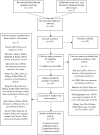Self-compassion and Psychological Distress in Adolescents-a Meta-analysis
- PMID: 30100930
- PMCID: PMC6061226
- DOI: 10.1007/s12671-017-0850-7
Self-compassion and Psychological Distress in Adolescents-a Meta-analysis
Abstract
Research indicates that self-compassion is relevant to adolescents' psychological well-being, and may inform the development of mental health and well-being interventions for youth. This meta-analysis synthesises the existing literature to estimate the magnitude of effect for the association between self-compassion and psychological distress in adolescents. Our search identified 19 relevant studies of adolescents (10-19 years; N = 7049) for inclusion. A large effect size was found for an inverse relationship between self-compassion and psychological distress indexed by anxiety, depression, and stress (r = - 0.55; 95% CI - 0.61 to - 0.47). The identified studies were highly heterogeneous, however sensitivity analyses indicated that correction for publication bias did not significantly alter the pattern of results. These findings replicate those in adult samples, suggesting that lack of self-compassion may play a significant role in causing and/or maintaining emotional difficulties in adolescents. We conclude that self-compassion may be an important factor to target in psychological distress and well-being interventions for youth.
Keywords: Adolescence; Anxiety; Depression; Meta-analysis; Self-compassion; Stress.
Conflict of interest statement
Compliance with Ethical StandardsThis article does not contain any studies with human participants performed by any of the authors. The authors declare that they have no conflict of interest.
Figures
References
-
- Angold A, Costello EJ, Messer SC. Development of a short questionnaire for use in epidemiological studies of depression in children and adolescents. International Journal of Methods in Psychiatric Research. 1995;5:237–249.
-
- Baer, R. A., Lykins, E. L., & Peters, J. R. (2012). Mindfulness and self-compassion as predictors of psychological wellbeing in long-term meditators and matched nonmeditators. The Journal of Positive Psychology, 7(3), 230–238.
-
- Barnard LK, Curry JF. Self-compassion: conceptualizations, correlates, and interventions. Review of General Psychology. 2011;15(4):289–303. doi: 10.1037/a0025754. - DOI
-
- Barry CT, Loflin DC, Doucette H. Adolescent self-compassion: associations with narcissism, self-esteem, aggression, and internalizing symptoms in at-risk males. Personality and Individual Differences. 2015;77:118–123. doi: 10.1016/j.paid.2014.12.036. - DOI
-
- Beck AT, Steer RA. Manual for the revised Beck depression inventory. San Antonio: Psychological Corporation; 1987.
Publication types
LinkOut - more resources
Full Text Sources
Other Literature Sources
Medical


